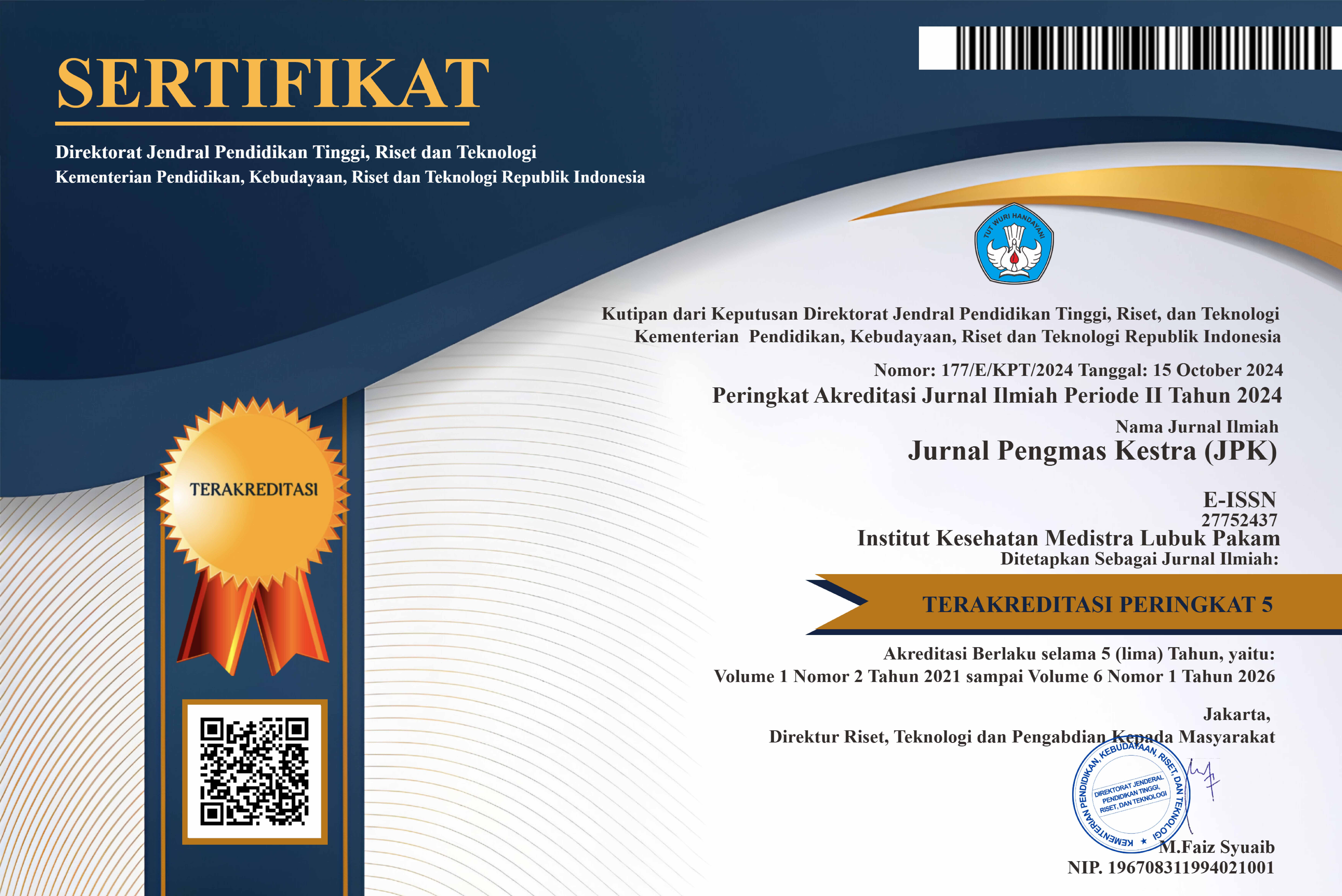Socialization of The Effectiveness Test of Antifungi Formulation of Garlic (Allium Sativum L.) Ethanol Extract Mouth on The Growth of Candida Albicans
DOI:
https://doi.org/10.35451/jpk.v3i2.1975Keywords:
Mouthwash; Allium sativum L; agar diffusion; Candida albicansAbstract
Garlic plants (Allium sativum L.) can be found in almost all parts of Indonesia, including in Lubuk Pakam, Deli Serdang. The content contained in the ethanol extract of garlic has various secondary metabolites with a role as an antifungal, namely tannins, saponins, flavonoids, and alkaloids. As utilization and information to the public that garlic ethanol extract is made into mouthwash formulations. This article reports on outreach activities to the people of Lubuk Pakam, to be precise in Lubuk Pakam Pekan sub-district about the potential use of natural garlic mouthwash formulations. Testing the antifungal activity of mouthwash preparations was produced by showing the average diameter of inhibition in the form of F1 (12.3 mm), F2 (17.3 mm), F3 (18.5 mm) and F4 (21.6 mm). This means that the higher the concentration, the better the inhibition of garlic ethanol extract in inhibiting fungal growth.
References
Ameh, G., Eze. S. C.& Omeje, F. U. (2013). Phytochemical screening and antimicrobial studies on the metabolic blbextract of Allium sativum. African Journal of Biotechnology, 12(14), 1665-1668.
Brescansin. (2013). Physical and chemical analysis of commercial nystatin. Acta Scientiarum, 35(2), 215-221.
Garba, (2013). Phytochemical and bacterial properties of garlic extracts. Bayero Journal of Pure and Applied Science, 6(2), 45-48.
Huzaifa, U., Labaran, I., Bello, A. B.& Olatunde, A. (2014). Phytochemical screening ofaqueous extract of garlic (Allium sativum) bulb. Report and opinion 2014, 6(8), 1-4.
Justicia, A.K., Ferdinan, Ade., Maya, Mariani. 2017. Formulasi Mouthwash Minyak Atsiri Daun Kemangi (Ocimum Sanctum L.) dan Kayu Manis (Cinnamomum Zeylanicum) dengan Menggunakan Tween 80 sebagai Surfaktan. Jurnal Ilmiah Ibnu Sina, Vol.2, No.1. Hal. 134-146.
Musyirna, Emma S, Sumiati R. 2013 –Isolasi jamur penyebab infeksi kulit dan uji aktivitas antijamur ekstrak etanol bawang putih (Allium sativum L.) dan lengkuas merah (Alpinia purpurata K.Schum). Jurnal Photon, Sekolah Tinggi Ilmu Farmasi Riau, Pekanbaru, 3(2), 39–46
Nuryanti. 2016. Formulasi Sediaan Krim Antioksidan Ekstrak Etanolik Daun Alpukat (Persea americana Mill). Acta Pharmaciae Indonesia. Vol 4 (2) 21-28.
Roslizawaty, Ramadani NY, Fakhrurrazi dan Herrialfian. 2013. Aktivitas Antibakterial Ekstrak Etanol dan Rebusan Sarang Semut (Myrmecodia sp.) Terhadap Bakteri Escherichia coli. Jurnal Medika Veterinaria; 7(2).
Sardi JC,Scorzoni L, Bernardi T, Fusco-Almeida AM, Mendes GM.2013 –Candida species: current epidemiology, pathogenicity, biofilm formation, natural antifungal products and new therapeutic options. Journal of Medical Microbiology, 62, 10–24.
Valentine, H. M., Nasution, H., Sastypratiwi, H. (2015). Perancangan Sistem Pakar Diagnosia Awal Penyakit Gigi dan Mulut Menggunakan Metode empster Shafer. Portal Garuda Journal: 1-7.
Wayan, N.n, N.(2020). Screening Candida Albicans Penyebab Kandidiasis Oral Dan Edukasi Oral Hygiene Pada Lansia Di Panti Sosial Tresna Werdha Wana Seraya Bali. Jurnal Pengabdian kesehatan. Vol 3 (1).
Downloads
Published
Issue
Section
License
Copyright (c) 2023 Chandra Pranata

This work is licensed under a Creative Commons Attribution 4.0 International License.
Copyright in each article is the property of the Author.




















